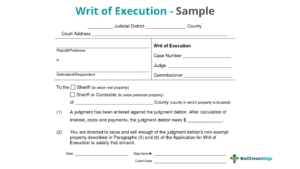How to Get a Court-Appointed Attorney
Definition of Court-Appointed Attorneys
When facing legal challenges, individuals may wonder how to secure proper legal representation, especially if they cannot afford to hire a private attorney. In such cases, the legal system provides a solution through court-appointed attorneys.
Importance of Legal Representation
Legal representation is a fundamental right, and understanding the avenues to secure it is crucial. This article explores the process of obtaining a court-appointed attorney across various legal scenarios.
Overview of Court-Appointed Attorneys
Getting legal representation can be expensive, but defendants in criminal cases have a constitutional right to an attorney, even if they cannot afford one. This article covers when and how you can obtain a court-appointed lawyer in criminal, juvenile, and certain civil cases.
Criminal Cases
Can I get a court-appointed attorney in a criminal case?
Yes, the 6th Amendment guarantees criminal defendants the right to an attorney. If you face jail time and meet income eligibility rules, the court must appoint you an attorney for free or at reduced cost. This applies to felonies, Class A & B misdemeanors, and some appeals/habeas proceedings.
The court determines if you qualify based on your charges and financial situation. If approved, a public defender or private attorney will be assigned to represent you. So even if you can’t afford legal fees, you can still get experienced counsel on your side.
What if I’m applying for an expunction or a nondisclosure order?
You typically don’t qualify for a court-appointed attorney to seal or expunge records. You’ll need to represent yourself, use legal aid resources, or hire an attorney. Some organizations offer free expunction clinics to assist people through the paperwork.
Right to an Attorney (U.S. Constitution)
The Sixth Amendment of the U.S. Constitution establishes the right of defendants in criminal cases to be represented by an attorney. This constitutional provision forms the bedrock of legal representation in criminal proceedings.
Texas Code of Criminal Procedure
In Texas, the right to an attorney in criminal cases is codified in Article 1.05 of the Texas Code of Criminal Procedure. This section outlines the circumstances under which a court can appoint an attorney for individuals who cannot afford one.
Qualifying for a Court-Appointed Attorney
To qualify for a court-appointed attorney in Texas, individuals must meet specific criteria outlined in Article 1.051 of the Texas Code of Criminal Procedure. Income levels, the nature of the charges, and the potential for incarceration play key roles in determining eligibility.
Juvenile Cases
Can I get a court-appointed attorney in a juvenile case?
Juvenile Court Proceedings
Delving into the nuances of court-appointed attorneys in juvenile cases, exploring the Texas Family Code and its provisions for minors between the ages of 10 and 17.
Appointment of Attorneys for Minors
Examining the process by which attorneys are appointed for minors in juvenile cases, considering the responsibilities of parents and the court’s role in ensuring legal representation.
Best Interest of the Child
Highlighting the significance of representing the best interests of the child in juvenile cases, including instances where the court has the discretion to appoint an attorney.
Resources on Juvenile Attorneys
Providing resources and references for further understanding the right to a court-appointed attorney in juvenile cases, including legal analyses and electronic resources.
Civil Cases
Limited Right to Court-Appointed Attorneys
Contrasting the availability of court-appointed attorneys in civil cases with the broader application in criminal cases, setting the stage for exceptions in specific civil situations.
Exceptions in Civil and Family Law Cases
Exploring scenarios where court-appointed attorneys are exceptions rather than the rule in civil and family law cases, emphasizing the unique circumstances that may warrant such appointments.
Specific Types of Civil Cases with Court-Appointed Attorneys
Navigating through specific statutes and codes, detailing instances where court-appointed attorneys may be designated, such as cases involving children, incapacitated persons, or involuntary commitments.
Understanding Texas Government Code Sections
Delving into the details of Texas Government Code Sections 24.016 and 26.049, which grant district and county courts discretionary powers to appoint counsel in select civil cases.
Can I get a court-appointed attorney in a civil case?
Generally no. Most civil litigants must retain private counsel or go without representation. But for certain matters, the court may provide an attorney to parties who qualify based on income. Common examples include:
Abortion
Minors seeking judicial bypass for an abortion without parental consent can receive court-appointed lawyers per Texas Family Code Sect. 33.003. This helps vulnerable youth navigate the legal process confidentially.
Child Custody
Custody cases initiated by Child Protective Services often come with court-appointed ad litem attorneys to represent children and indigent parents (Texas Family Code Sect. 107). Their advocacy aims to secure the child’s best interests.
Civil Contempt
Indigent defendants facing jail time in civil contempt hearings can obtain appointed counsel under Texas Code of Criminal Procedure Sect. 1.051. This prevents unlawful detention of those unable to pay fees.
Commitment to Treatment
Before civil courts can order involuntary commitment to mental health or sex offender treatment facilities, state law guarantees appointment of an attorney to the respondent (Texas Health & Safety Code Sect. 574.003, 841.005). Counsel ensures due process is followed before a person loses their liberty.
Emancipation of Minors
Courts will designate an amicus attorney or ad litem to promote unemancipated minors’ interests during judicial emancipation proceedings, as mandated by Texas Family Code Sect. 31.004. Their role is to evaluate the youth’s maturity and independence.
Eviction Appeals
Some counties offer pro bono counsel for indigent tenants appealing evictions under Texas Government Code Sect. 25.002. Volunteers help level the legal playing field and reduce homelessness.
Guardianship
Proposed wards facing guardianship receive appointed lawyers per Texas Estates Code Sect. 1054.001. Attorneys act as advocates for the ward’s preferences and protect their rights against unjust intervention.
Probate
Courts may appoint ad litem counsel for interested persons in probate disputes who could otherwise not afford representation, under Texas Estates Code Sect. 53.104. They advocate based on that individual’s viewpoint of the estate matters.
Truancy
While not guaranteed, judges can appoint attorneys for children in truancy cases deemed in the minor’s best interest per Texas Family Code Sect. 65.059. Lawyers work with all parties to address root causes of absenteeism compassionately.
Conclusion
Court-appointed attorneys serve a vital role in the legal system by ensuring access to counsel, fairness, and competent representation for indigent and vulnerable populations. Across criminal, juvenile, and specific civil proceedings, these lawyers advocate for individuals who otherwise may struggle through the complex judicial process alone. Often this appointed counsel comes at little or no cost to the client. Checking if you qualify can be as simple as asking the court staff or judge.
Frequently Asked Questions
Q: What is the income threshold to qualify for a court-appointed attorney?
A: Income cutoffs vary by location and case types. Many courts use eligibility guidelines tied to Federal Poverty Level percentages, such as 125%, 150%, or 200% of FPL. Defendants should check with local rules and staff to find out monetary criteria.
Q: Can I request a new court-appointed lawyer if I don’t like the one I’m assigned?
A: Maybe, but the bar is high. You must show good cause, like an irreconcilable conflict or evidence your current attorney is not providing effective counsel. The judge decides whether your complaint warrants a new appointment.
Q: If I receive a court-appointed attorney but later can afford a private lawyer, do I need to pay back costs?
A: Potentially yes. Some states have recoupment laws allowing them to seek reimbursement for legal expenses if your financial situation sufficiently improves post-conviction. Check local rules or ask your attorney.
Q: Can I use a court-appointed lawyer for my appeal?
A: Yes, if you qualified for appointed counsel at the lower court level and remain financially eligible, you can continue that representation on appeal, have your attorney file to withdraw, or request new appointed counsel.
Q: Do court-appointed attorneys provide lower quality legal services than private lawyers?
A: No. They must meet the same competency and ethical standards as the private bar when representing clients. Many public defenders and assigned counsel have exceptional qualifications and expertise from handling hundreds of similar cases.
Can I choose my court-appointed attorney?
In most cases, individuals cannot choose their court-appointed attorneys. The court typically assigns an attorney based on availability and expertise.
What should I do if I disagree with my court-appointed attorney?
If there are issues with your court-appointed attorney, it’s advisable to communicate your concerns to the court. They may evaluate the situation and, if necessary, make changes to ensure effective representation.
Are court-appointed attorneys as effective as private attorneys?
The effectiveness of a court-appointed attorney can vary, but they are trained professionals obligated to provide competent representation. In some cases, they may be as effective as private attorneys.
How do I apply for a court-appointed attorney?
The process for applying for a court-appointed attorney varies by jurisdiction. Generally, the court will assess your financial situation and the nature of the case to determine eligibility.
What happens if I don’t qualify for a court-appointed attorney?
If you don’t qualify for a court-appointed attorney, you may explore other options, such as seeking pro bono legal assistance or hiring a private attorney. Legal aid organizations and local bar associations can provide guidance.







